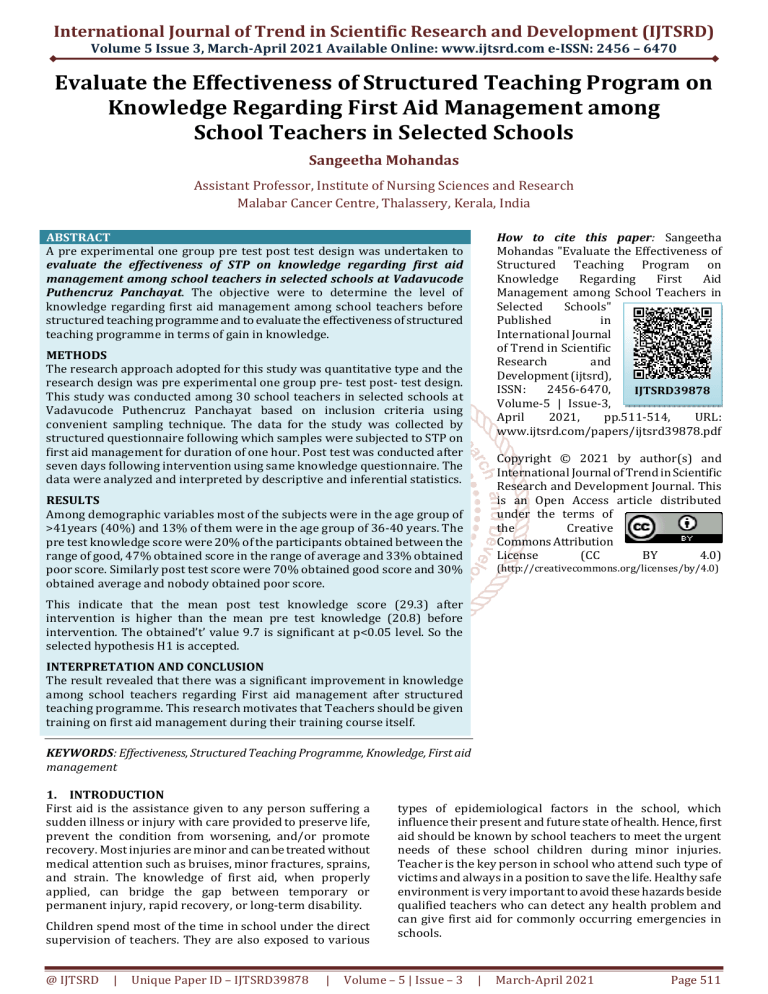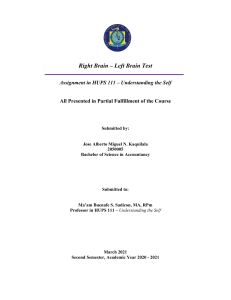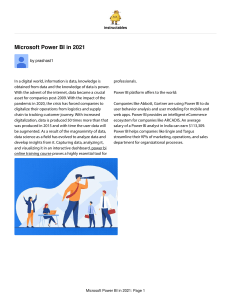
International Journal of Trend in Scientific Research and Development (IJTSRD)
Volume 5 Issue 3, March-April 2021 Available Online: www.ijtsrd.com e-ISSN: 2456 – 6470
Evaluate the Effectiveness of Structured Teaching Program on
Knowledge Regarding First Aid Management among
School Teachers in Selected Schools
Sangeetha Mohandas
Assistant Professor, Institute of Nursing Sciences and Research
Malabar Cancer Centre, Thalassery, Kerala, India
How to cite this paper: Sangeetha
Mohandas "Evaluate the Effectiveness of
Structured Teaching Program on
Knowledge
Regarding
First
Aid
Management among School Teachers in
Selected
Schools"
Published
in
International Journal
of Trend in Scientific
Research
and
Development (ijtsrd),
ISSN:
2456-6470,
IJTSRD39878
Volume-5 | Issue-3,
April
2021,
pp.511-514,
URL:
www.ijtsrd.com/papers/ijtsrd39878.pdf
ABSTRACT
A pre experimental one group pre test post test design was undertaken to
evaluate the effectiveness of STP on knowledge regarding first aid
management among school teachers in selected schools at Vadavucode
Puthencruz Panchayat. The objective were to determine the level of
knowledge regarding first aid management among school teachers before
structured teaching programme and to evaluate the effectiveness of structured
teaching programme in terms of gain in knowledge.
METHODS
The research approach adopted for this study was quantitative type and the
research design was pre experimental one group pre- test post- test design.
This study was conducted among 30 school teachers in selected schools at
Vadavucode Puthencruz Panchayat based on inclusion criteria using
convenient sampling technique. The data for the study was collected by
structured questionnaire following which samples were subjected to STP on
first aid management for duration of one hour. Post test was conducted after
seven days following intervention using same knowledge questionnaire. The
data were analyzed and interpreted by descriptive and inferential statistics.
Copyright © 2021 by author(s) and
International Journal of Trend in Scientific
Research and Development Journal. This
is an Open Access article distributed
under the terms of
the
Creative
Commons Attribution
License
(CC
BY
4.0)
RESULTS
Among demographic variables most of the subjects were in the age group of
>41years (40%) and 13% of them were in the age group of 36-40 years. The
pre test knowledge score were 20% of the participants obtained between the
range of good, 47% obtained score in the range of average and 33% obtained
poor score. Similarly post test score were 70% obtained good score and 30%
obtained average and nobody obtained poor score.
(http://creativecommons.org/licenses/by/4.0)
This indicate that the mean post test knowledge score (29.3) after
intervention is higher than the mean pre test knowledge (20.8) before
intervention. The obtained’t’ value 9.7 is significant at p<0.05 level. So the
selected hypothesis H1 is accepted.
INTERPRETATION AND CONCLUSION
The result revealed that there was a significant improvement in knowledge
among school teachers regarding First aid management after structured
teaching programme. This research motivates that Teachers should be given
training on first aid management during their training course itself.
KEYWORDS: Effectiveness, Structured Teaching Programme, Knowledge, First aid
management
1. INTRODUCTION
First aid is the assistance given to any person suffering a
sudden illness or injury with care provided to preserve life,
prevent the condition from worsening, and/or promote
recovery. Most injuries are minor and can be treated without
medical attention such as bruises, minor fractures, sprains,
and strain. The knowledge of first aid, when properly
applied, can bridge the gap between temporary or
permanent injury, rapid recovery, or long-term disability.
Children spend most of the time in school under the direct
supervision of teachers. They are also exposed to various
@ IJTSRD
|
Unique Paper ID – IJTSRD39878
|
types of epidemiological factors in the school, which
influence their present and future state of health. Hence, first
aid should be known by school teachers to meet the urgent
needs of these school children during minor injuries.
Teacher is the key person in school who attend such type of
victims and always in a position to save the life. Healthy safe
environment is very important to avoid these hazards beside
qualified teachers who can detect any health problem and
can give first aid for commonly occurring emergencies in
schools.
Volume – 5 | Issue – 3
|
March-April 2021
Page 511
International Journal of Trend in Scientific Research and Development (IJTSRD) @ www.ijtsrd.com eISSN: 2456-6470
The primary purpose of the study was to make school
teachers more competent in proving first aid care for minor
injured children in schools through structured teaching
programme. This may apply their knowledge regarding the
first aid management of selected minor injuries to encounter
the children at primary school, which would further help in
reducing the complications and advancement of the
problem. Indirectly, it would also help in reducing
absenteeism rate of primary school children due to minor
injuries.
According to national first aid science advisory board, first
aid should be learned by every person for this it is necessary
that first aid training and education should be provided to
everyone and should be important. In school, teachers are
the first caregivers who protect the children from trauma
and accidents. Every teacher should have the ability to deal
with any health emergency condition, when a children need
healthcare. The victim should get immediate management of
any accidents or trauma for good and early prognosis.
2. Need For Study
It is very difficult for a man to go out somewhere and return
safely because we cannot give any guarantee or security to
our life. This is the world of accidents. So many accidents
occur in many places like in schools, during travelling, when
doing our daily activities and all. People motive is just to get
away from the place when accident occurs. They do not
come forward to help or to have some first aid care because
they are not aware of giving first aid for injuries. We could
see the same situations in the school also. Recently the tragic
death of a 10 year old child after she was bitten by a snake
while inside her classroom at Sulthan Bathery in Wayanad.
The school authorities took no effective steps to provide first
aid or to take the child to a hospital.
A lot of care must be taken while the students are in the
playground or in public places. So the awareness on first aid
has to be given for the school teachers. Because, first aid
training not only provide with knowledge and skills to give
life but also help to develop safety awareness and habits that
promote safety at home, at work, during recreation and on
the streets and highways. Every time a health worker would
not be available in the school: where the accidents can take
place at any point of time. It is needed or desired that the
staff of the school should have knowledge so that they can
responsible to look after the minor ailments or accidents in
the school. Student’s safety is a major concern for the
parents and the school staff. So the present study aimed to
assess knowledge regarding first aid management the school
teachers.
Unintentional injuries, such as falls, bruises, and bumps
likewise occur in child-care programs. Schools and
playgrounds are the most common location for falls (40.4%),
and approximately 39% of reported injuries in child-care
settings involve bites.
Objectives
To determine the pre-test knowledge score on first aid
management among school teachers.
To assess the effectiveness of structured teaching
programme on knowledge regarding first aid
management among school teachers.
Vadavucode. The sampling technique used for selecting the
sample was non probability purposive sampling technique.
The sample size for the present study is 30.Data was
collected after obtaining permission from concerned school
authorities and participant's informed consent. The tools
were: Tool 1- Demographic Performa, Tool 2- Structured
knowledge questionnaire on first aid management of
selected minor ailments. The demographic Performa
consisted of the background information of the samples. The
knowledge questionnaire had 30 multiple choice items with
one correct answer for each. Each item was carrying a score
of one for correct answer and a score of zero for the wrong
answer The knowledge score was classified as: Poor
knowledge:0-10,
Average
knowledge:11-20,
Good
knowledge:21-30.
Pre-test was administered to the participants on day 1, using
demographic Performa and structured knowledge
questionnaire. After the pre-test a structured teaching
programme on first aid management was given for three
days (one hour session on each day) using PPT slides. On day
8, a post-test was conducted using the same knowledge
questionnaire. The data collected were analysed using
descriptive and inferential statistics
4. Analysis and Interpretation
“Data analysis is the process of organizing and synthesizing
data in such a way that research questions can be answered”.
The purpose of data analysis, regardless of the type of the
data one has, is to impose some order on a large body of
information so that the data can be synthesized, interpreted
and communicated”.
The present study was done to assess the effectiveness of
structured teaching programme on first aid management
among school teachers of selected schools at Vadavucode
Puthencruz Panchayat.
Objectives of the study
To determine the pre-test knowledge score on first aid
management among school teachers.
To assess the effectiveness of structured teaching
programme on knowledge regarding first aid
management among school teachers.
Statistical hypothesis
H1: There will be a significant difference in mean pretest and mean post-test knowledge score of the subject.
H0: There will be no significant difference in mean pretest and mean post-test knowledge score of the subject.
DISTRIBUTION OF DEMOGRAPHIC VARIABLES AMONG
PARTICIPANTS
Table-1 DISTRUBTION OF SUBJECT BY AGE
N=30
Age
Frequency Percentage
25-30
9
30%
31-35
5
16.7%
36-40
4
13.3%
>41
12
40%
Data given in table no.1 shows that 40% of subject belongs to
age group of >41 years.
3. Materials and Methods
A quantitative research approach was used to evaluate the
knowledge of teachers from the selected schools of
@ IJTSRD
|
Unique Paper ID – IJTSRD39878
|
Volume – 5 | Issue – 3
|
March-April 2021
Page 512
International Journal of Trend in Scientific Research and Development (IJTSRD) @ www.ijtsrd.com eISSN: 2456-6470
DISTRUBTION OF SUBJECT BY QUALIFICATION
N=30
Qualification Frequency Percentage
TTC
9
30%
B.Ed
21
70%
Data given in table no.4 shows that 70% of subject belongs to
qualification of B.Ed
Data given in Figure1 the bar diagram showing age
wise distribution of participants
DISTRUBTION OF SUBJECT BY YEAR OF EXPERIENCE
N=30
Year of Experience Frequency Percentage
1-5 years
5
16.7%
6-10years
12
40%
>10years
13
43.3%
Data given in table no.2 shows that 43.3% of subject belongs
to >10 years of experience.
Figure 4 pie diagram shows the distribution of
educational qualification among subjects
DISTRUBTION OF SUBJECT BY AREA OF RESIDENCE
N=30
Area of Residence Frequency Percentage
Urban
17
56.7%
Rural
13
43.3%
Data given in table no.5 shows that 56.7% of subject belongs
to urban area of residence
Figure 2 the cone diagram shows the distribution of
year of experience among subjects.
DISTRUBTION OF SUBJECT BY TYPE OF FAMILY
N=30
Type of Family Frequency Percentage
NUCLEAR
20
66.7%
JOINT
10
33.3%
Figure 5 cylindrical diagram shows the distribution of
area of residence
Data given in table no.3 shows that 66.7% of subject belongs
to nuclear family
COMPARISON OF PRE-TEST AND POST –TEST LEVEL OF
KNOWLEDGE AMONG SCHOOL TEACHERS
N=30
Pre test
Post test
Domain
Frequ Percent Freque Percent
ency
age
ncy
age
Poor
10
33.3%
0
Average
14
46.7%
9
30%
Good
6
20%
19
63.3%
Excellent
0
2
6.7%
EFFECTIVENESS
PROGRAMME
Figure 3 pie diagram shows the distribution of type of
family among subjects.
@ IJTSRD
|
Unique Paper ID – IJTSRD39878
|
Volume – 5 | Issue – 3
OF
STRUCTURED
TEACHING
N=30
Mean SD t Value
Pre test 12.10 1.9
14.85
Post test 20.06 2.1
*p<0.05 (level of significance)
|
March-April 2021
Page 513
International Journal of Trend in Scientific Research and Development (IJTSRD) @ www.ijtsrd.com eISSN: 2456-6470
5. Discussion :
In this study, the knowledge and practices posttest score of
primary school teachers were significantly higher compare
to pretest knowledge score about first aid management of
selected minor injuries. The results revealed that there was a
significant difference between the mean pre test and post
test knowledge scores of the school children which indicated
that the teaching programme was effective,(t=14.85, p<0.05)
hence H1 is accepted and Ho is rejected.
6. Conclusion :
The study concluded that the structured teaching
programme was effective in bringing the desired changes in
the knowledge of school teachers on first aid management.
Hence it can be used as an effective teaching strategy among
the school teachers to spread health messages.
7.
A.
B.
C.
Recommendations:
The study can be conducted on large samples.
The study can be done in large settings.
Comparative study can be done between urban and
rural school teachers.
D. A similar study can be replicated with an experimental
research approach.
Bibliography
[1] Maheshwari Lognathan. Essential of first aid for
nursing. 1st ed. Jaypee publications. P. No. 12-27.
[2]
J. K. Indrani. First aid for nurses. 1st ed. Mumbai:
Jaypee publications. P. No106, 168.
[3]
Dr. Shashank. V. Parulekar. First aid. 3rd ed. Mumbai:
Vora medical publications. P. No. 12-32.
@ IJTSRD
|
Unique Paper ID – IJTSRD39878
|
[4]
Parvesh saini, Puja Saluja. First aid and emergency
management. 1st ed. Lotus publications. P. No. 66, 118,
182.
[5]
I Clement. Text book of first aid and emergency
nursing. 2nd ed. India: Jaypee publications. P. No:53 61
[6]
Dr. T. S. Vasudevan. A quick reference book on first
aid with poison care index. H&C Publishing house. P.
No: 40 - 56.
[7]
Ajay Singh. First aid and emergency care. 9th enlarged
ed. N. R. Brothers publishers. P. No:133 -136
[8]
Le Gupta, Abijith Gupta. Manual of first aid. 5th ed.
Kolkatha: Jaypee publications. P. No:147-156
[9]
J Makarska, D Myrcik. Evaluation knowledge of
teachers and primary school students principles of
first aid. International journal of paediatrics, 2010
5;23:p:883-889
[10]
S Bavrak, E Sari Tunces. Evaluation of elementary
school teachers knowledge and attitude immediate
emergencies, Indian journal of medical sciences 2009;
63
[11]
S Masib et al. A knowledge and practice of primary
school teachers about first aid management of
selected mior injury among children. International
Journal of medicine and public health 2014;4:p. 45862.
[12]
International journal of advanced in nursing
management, ISSN [ONLINE] 2016; 4, 3July-Sept.
Volume – 5 | Issue – 3
|
March-April 2021
Page 514








